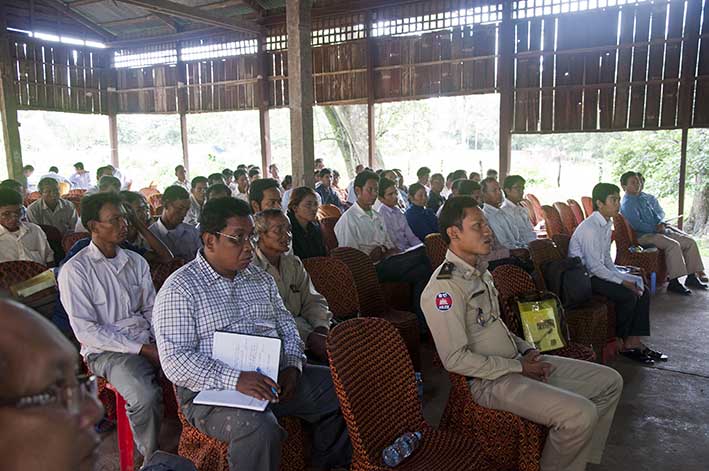Battambang (September 05, 2014) – Findings of a survey on land dispute in Boeng Pram commune, Bavel district of Battambang province were presented at a half-day workshop today at Tumnob Tuek village in Bavel district.
 |
The workshop, co-organized by LWD and Bavel District Administration, aimed to disseminate the results of the survey to the public, especially to those who are involved in a long-running land dispute in the area. The participants included representatives from LWD, Provincial Department of Land Management, Urban Planning, Construction and Cadastral, Social Land Concession Working Groups at the provincial and district levels, DCA/CA, and land claimants from Boeng Pram, Ampil Pramdaeum, Prey Khpos, and Lvea communes.
 |
Mr. Tim Dareth, Bavel District Governors, said that today’s workshop was a fundamental one for strengthening both information management and documentation. The findings would be documented as a model paper and would be used as a tool for solving complicated land disputes in other regions across the country, he said.
So far, there were only 180 complainants. But, when the working group investigated the complaints and made a demarcation, the number of plots of land increased over 200. Thoroughly reviewing the relevant land documents found that 226 documents were faked. Almost all of the complainants did not know their own land boundary clearly when they were asked by the working group, according to the findings.
H. E Nguon Ratanak, Battambang Provincial Deputy Governor, supported the findings by the joint committee and said that the workshop provided a good opportunity for all the participants to learn about the findings at the same time.
He highly appreciated LWD, EU and DCA/CA, as well as related technical working groups for supporting the study. He advised the complaint resolution committee to actively further its work in order to handle all the complaints as possible.
The findings will be submitted to Battambang Provincial Governor for feedback and a national workshop will be held soon later this year in order to disseminate the findings to all concerned stakeholders.
The social land concession project, entitled “Securing Rights to Land and Sustainable Livelihoods Project” was jointly implemented by LWD and CEDAC in 2011 and expected to be completed in 2013. It was funded by the European Union through DanChurchAid (DCA)/CA. The objective of the project is to alleviate rural poverty by securing access to land through Social Land Concession and by improving quality of life of vulnerable households. As some major challenges and irregularities remain, the project was extended for another year.
 |
The target land recipients were landless and land-poor families living in seven villages in Boeng Pram Zone, Ampil Pramdeum commune, Bavel district, Battambang. There were 1,736 poor families applying for social land concession, according to Provincial Committee for State Land Management.
Of the total, 1,560 families were approved. As planned, each family would get one hectare of agricultural land and a plot of land, sized 40m by 40m for residence, while the rest were entitled to occupy their existing residential land of the same size. Because the available agricultural land accounted for 800 hectares, 1,299 out of 1,560 families were re-selected. Through a transparent process, each family got an agricultural land of 0.6 hectare in addition to their residential land.
However, only 70 out of 1,299 families can cultivate on their allotted agricultural land freely, while the rest were interrupted by 192 families living around Boeng Pram, claiming the land to be theirs and violently cultivate on the land, according the findings.
The project cost 700,000 Euros. Of the total, LWD received 439,748 Euros for implementing its specific activities. The implementation of the project includes two steps—land allocation and empowerment of the poor settling in the area to improve their livelihoods.
